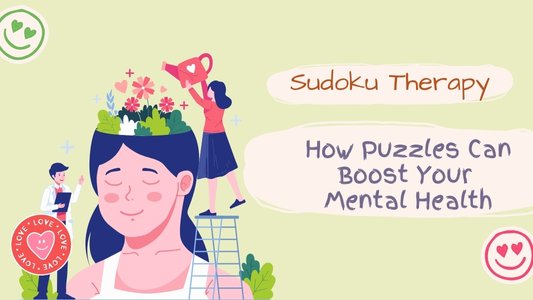Table of Contents
- The Connection Between Puzzles and Mental Health
- How Sudoku Improves Cognitive Skills
- Stress Relief Through Sudoku: The Science Behind It
- Why Sudoku Is the Perfect Mindfulness Tool
- Tips to Use Sudoku for Maximum Mental Health Benefits
- Conclusion: Sudoku—Your Daily Dose of Mental Clarity
- FAQs: Your Sudoku Therapy Questions Answered
1. The Connection Between Puzzles and Mental Health
Did you know solving puzzles can do wonders for your mind?
Puzzles aren’t just about passing the time; they’re a mental workout. Imagine your brain as a muscle—it craves challenges to stay strong. Research suggests activities like Sudoku stimulate brain pathways, much like lifting weights strengthens your body.
When you solve a Sudoku puzzle, you’re not just filling in numbers; you’re training your brain to think critically, analyze patterns, and focus deeply. It’s like a mini mental spa session.
2. How Sudoku Improves Cognitive Skills
Think of Sudoku as a gym for your mind, where logic and numbers are the weights.
Sudoku sharpens your reasoning skills. Every blank box forces your brain to dig into its problem-solving toolkit. Whether you’re scanning for missing numbers or figuring out a tricky placement, your memory and concentration get a solid boost.
Even better? This mental workout doesn’t stop when the puzzle ends. Studies suggest regular Sudoku players show improved memory retention and sharper attention spans in their day-to-day lives. Read more about the study. And honestly, who doesn’t want to be the sharpest person in the room?
3. Stress Relief Through Sudoku: The Science Behind It
Life can feel chaotic, but Sudoku offers a quiet corner of calm.
The simple act of focusing on a single task, like solving a Sudoku puzzle, can lower stress levels. It’s all about entering what psychologists call a “flow state.” In this state, you lose track of time, and your worries melt away. It’s like hitting the pause button on life’s chaos.
Research backs this up. Engaging in mindful activities like Sudoku has been shown to reduce cortisol levels—yes, the stress hormone! So, the next time you’re feeling overwhelmed, grab a Sudoku puzzle instead of doom-scrolling through social media. Read more about the research.
4. Why Sudoku Is the Perfect Mindfulness Tool
In a world full of noise, Sudoku helps you tune into the present.
Mindfulness is all about being present, and Sudoku delivers that in spades. As you solve, your mind focuses on the grid, shutting out distractions. There’s no room for overthinking or worrying—just numbers, logic, and a sense of accomplishment with every correct placement.
Unlike activities that demand multitasking, Sudoku demands single-minded attention. This focus promotes mindfulness, helping you feel grounded and refreshed.
5. Tips to Use Sudoku for Maximum Mental Health Benefits
Ready to turn Sudoku into your go-to mental wellness tool? Start here.
- Begin with easy puzzles: Don’t jump into the deep end. Start small to build confidence.
- Set aside time daily: Even 10 minutes can make a difference. Morning, lunch breaks, or before bed—it’s up to you.
- Enjoy the process: Forget perfection. Embrace mistakes; they’re part of learning.
- Explore resources: Online platforms like Sudoku Station offer puzzles for all levels. Whether you prefer apps or printable PDFs, find what works for you.
Consistency is key. Make Sudoku a habit, and you’ll see the mental health perks stack up over time.
6. Conclusion: Sudoku—Your Daily Dose of Mental Clarity
Who knew that a grid of numbers could bring so much calm and clarity?
Sudoku is more than a puzzle; it’s a pathway to better mental health. From sharpening your mind to easing stress, the benefits are undeniable. Plus, it’s an activity you can enjoy anytime, anywhere.
So why not grab a puzzle and give it a shot? Your mind will thank you, and who knows—you might just fall in love with the journey.
7. FAQs: Your Sudoku Therapy Questions Answered
Q1. Can Sudoku help with anxiety?
Absolutely! Sudoku’s calming focus can reduce anxious thoughts.
Q2. Is Sudoku suitable for kids and seniors?
Yes! It’s a fantastic activity for all ages to improve mental agility.
Q3. How often should I play Sudoku?
Even a few puzzles a week can bring noticeable benefits.
Q4. Does solving harder puzzles mean better results?
Not necessarily. Consistency matters more than difficulty.
